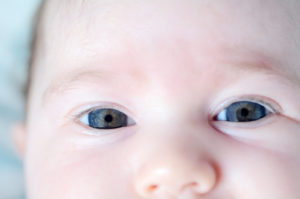
Why Pediatric Eye Exams Are So Important
The last thing a parent is thinking about in the hours after bringing a new child into the world is getting their baby’s eyes checked. After all, the hospital is checking for major issues right after birth, and the parents are so exhausted and overjoyed that vision isn’t a detail they are particularly worried about.
And, for the most part, this is okay. Hospital staff may give the child a quick exam to check for any obvious problems such as an unresponsive pupil which could indicate blindness, which is usually sufficient. Baby’s eyes, like the rest of the body, aren’t fully developed at the time of birth. Eye conditions often develop as the eyes do.
That’s why it’s so important to have your baby’s eyes checked regularly through infanthood until they reach 18. Pediatric eye exams are crucial to ensuring that your child has good vision for lice.
Why Is a Pediatric Eye Exam Important
We know how adults and young children get their eyes examined, but babies require a different type of exam altogether. Newborns obviously can’t communicate the same way children or adults do, so their vision health rests entirely in the parents’ hands.

Children’s eye exams rely on being able to ask the child a range of questions: what do they see, is it blurry, do their eyes hurt, can they read the letters on the wall? Not only can babies not talk to answer these questions, but they also have no idea how to comprehend what they’re seeing.
We can recognize blurry vision because we know what good vision should look like. When a baby sees blurry, it’s the only sight they’ve ever seen. There is no reference point, so to them, their vision is normal. If eye conditions are allowed to persist in babies, it’ll only lead to difficulty in school later as they get older.
It’s important to have your baby’s eyes checked so that they can start life on the right foot. Impaired sight can hold people of all ages back. Don’t prevent your baby from having a full life and get their eyes checked.
What Is a Pediatric Eye Exam?
A pediatric eye exam is an eye exam exclusively for babies. It’s important to know what goes on before your baby’s first eye exam so that you can be prepared. They will be slightly different than a kid’s eye exam.
Babies should get their first eye exam at six months old. Though their eyes are not fully developed by this point, they are very close to being able to see like adults already! The eyes develop faster than any other part of the body. By six months old, the baby should be starting to be able to focus and see colors almost like an adult.
By six months, your baby’s doctor needs to make sure that their eyes are developing the way they should be. If there is something wrong with the eyes, early detection is best for effectively treating the condition.
Your doctor will check your baby’s eye for signs of troubled vision and congenital eye conditions. They’ll also check the shape of the eye to make sure that it is developing healthily.
The appointment will likely start with your doctor asking you about your family’s vision history so they know to look out for certain things. If you’ve adopted a baby and don’t know their biological family’s vision history, make sure your doctor knows this.
Using a penlight, the doctor will check your baby’s eye shape for any irregularities. They will also test your baby’s focusing and tracking skills by watching if they can follow a toy as they move it in various directions.
Pediatrician or Optometrist?
A question you may have as a new parent is if you should bring your baby to their pediatrician or an optometrist for their first eye exam. That’s a tough question to answer since both medical doctors and optometrists seem to disagree. It comes down to your personal preference.
A good pediatrician will be trained to recognize warning signs for troubled vision. If they suspect something is wrong, they will refer you to a specialist who can fully treat your baby. Many pediatricians agree that bringing your baby to an optometrist at such a young age is expensive for nothing.
Optometrists, on the other hand, tell a different tale. They claim that many pediatricians don’t have the proper training to carry out eye exams or simply don’t have time to do them. As a result, too many babies’ eyes go unchecked.
Whomever you choose to carry out your baby’s eye exam, one thing is for sure: your baby needs to have their eyes checked. If you come across a pediatrician who thinks eye exams aren’t important, consider finding one who does.
Looking Out for Warning Signs
Possibly more important than getting your baby’s eyes checked is looking out for impaired vision warning signs. It all begins with you. If you spot anything fishy early, you may be saving your baby from a lifetime of poor vision.
First, you need to know that babies are still adjusting to the world around them. So if in the first three months of life they seem to have crossed eyes or have trouble following movement, it is completely normal. Make sure to monitor this behavior. Tell your doctor what you observed when you go in for their first eye exam at six months.
Here are some other things to look out for:
- Your baby’s eyes don’t move together or don’t move normally
- After one month of life, your baby does not get distracted by lights, colors, or mobiles
- The lens of your baby’s eye looks cloudy
- Your baby rubs or squints their eyes frequently when not sleepy
- Your baby needs to tilt their head when looking at things
- After three months, if your baby does not follow a toy with their eyes as it’s being moved in front of them
If you notice any of these signs, talk to your pediatrician or optometrist about it.
Keeping your baby healthy now will set them up for a lifetime of good health. You can’t exclude the eyes. Remember that diet is important in building healthy vision as well. Once they reach childhood, it may be too late to fix vision problems that could have been fixed in infancy.
Our Rebuild Your Vision Ocu-Plus Formula Contains All 17 Vitamins, Minerals, and Herbal Supplements to Improve Your Eye Health!












Leave Your Reply